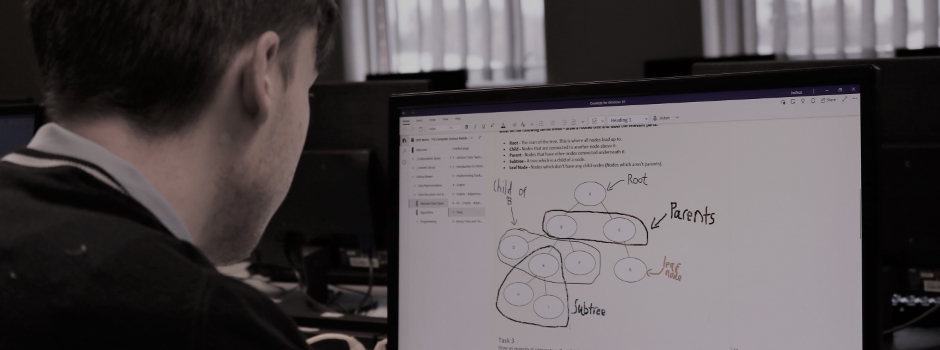


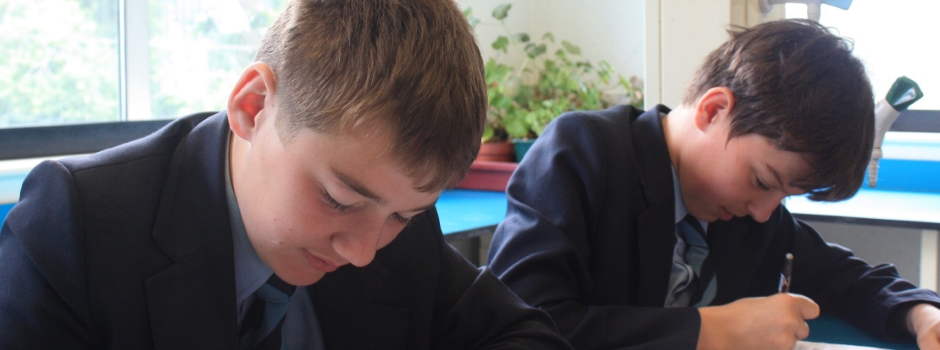
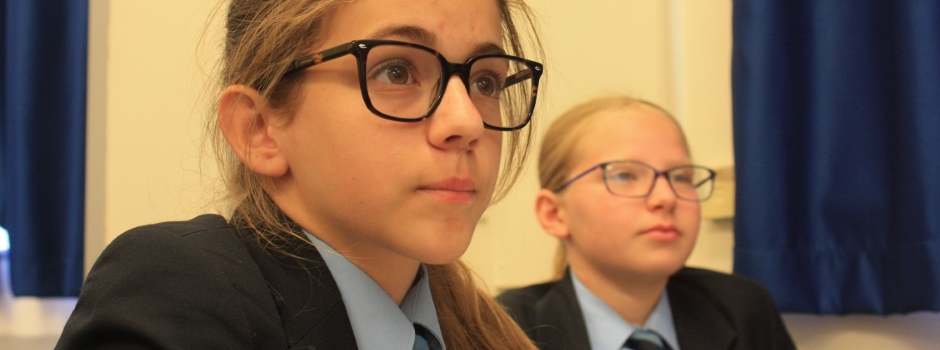








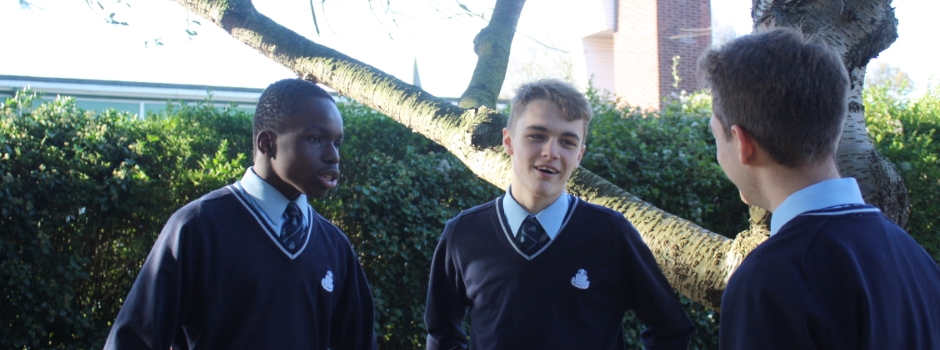



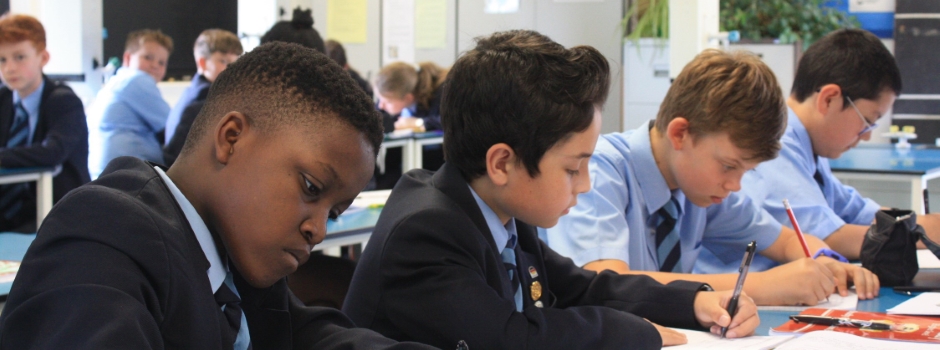












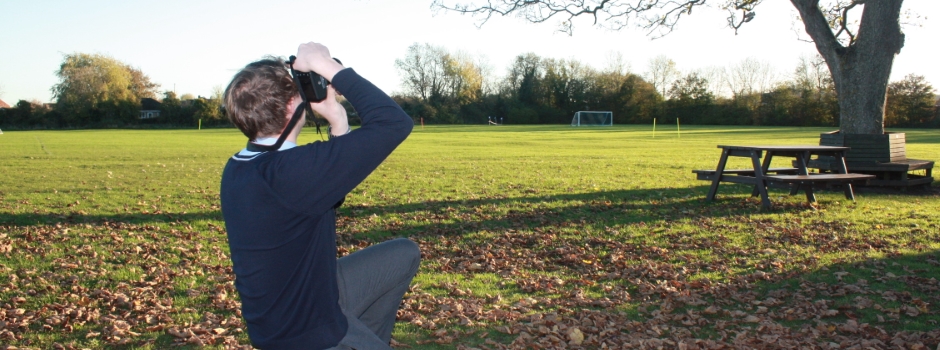
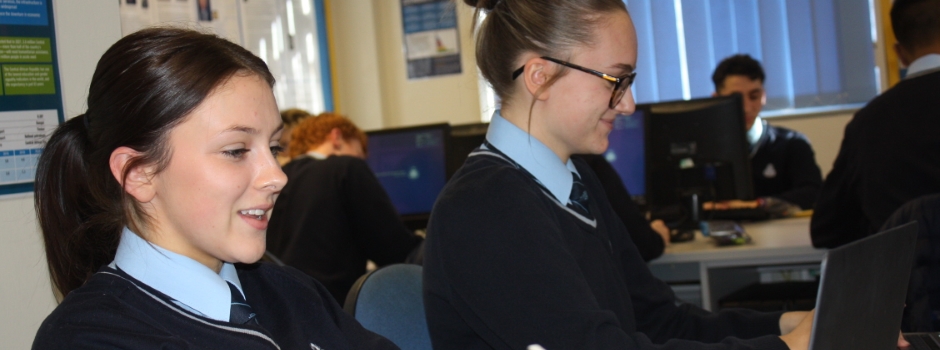


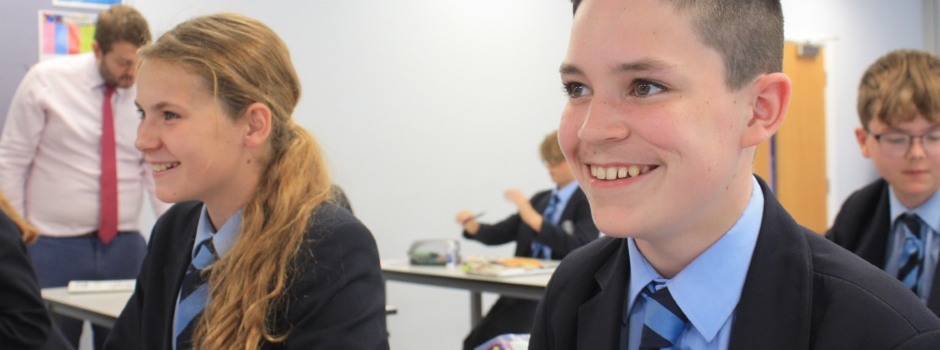



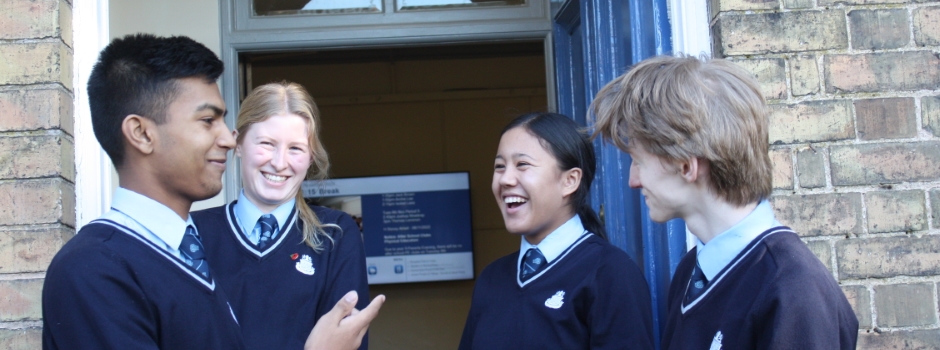

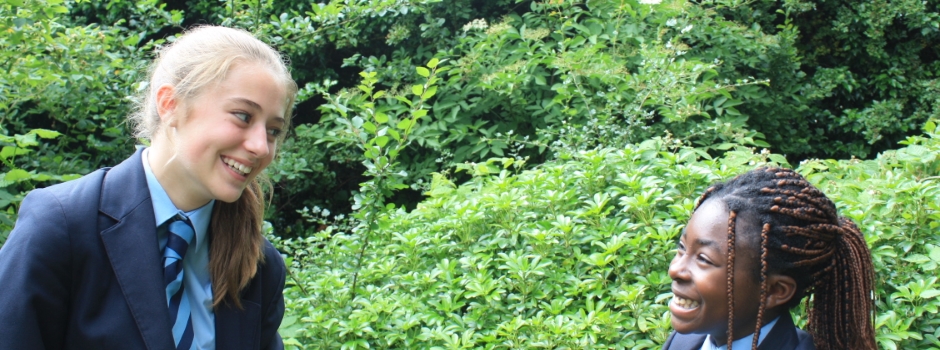











"It's been a whirlwind of wonderful experiences for him. I am so grateful that he’s been at a school that has nurtured and enabled him - thank you."
Year 7 - Curriculum on a Page
Showing the curriculum by year
Year 7
Curriculum Details - 2023/2024 (Current)
| Subject | Term 1 | Term 2 | Term 3 | Term 4 | Term 5 | Term 6 |
| Art | Baseline assessment tasks - Review of knowledge, observational drawing and critical analysis. The Elements - focusing on tone and line. How to use these elements in art work. Media - pencil and fine line pen. Drawing and Mark making. | The Elements Drawing and Mark making - focusing on texture and colour. Looking at actual and visual texture, working from direct observation and using imagination. Layering with coloured pencils and introduction to paint. | Ceramics - making a three dimensional clay tile Clay tile techniques, slab, coiling, modelling, joining techniques, firing, decorating, glazing Inspired by Lincoln Cathedral and ceramicist Chris Gryder | Perspective and Op Art Landscape and interior spaces - how to create a one perspective landscape and interior space. Understanding how to use a vanishing point, horizon line and converging lines. Looking at the work of Op artist Victor Vasarely Coloured pencil layering. | Still- life, learning how to set up a still-life arrangement. Observational drawing and painting, ellipses, drawing 3D objects Artist- Paul Cezanne, watercolour painting techniques. Summer exam - review of work covered throughout the year. | Cultural project - Mexican spirit animals Learning about Mexican culture. Creating a spirit animal painting. Imaginative creative writing linked to spirit animal. Media - tempera paint and marker pens. |
| Computing | Network Introduction and eSafety/Cyber Security - this covers how to use our main digital systems as well as introducing some potential eSafety issues and how to avoid them becoming a problem. | Initial Assessment of problem solving skills using the Bebras Algorithms - Looking at what an algorithm is and some common uses for algorithms - concentrating on searching and sorting. | Programming 1 - an introduction to Python using turtle. Spreadsheets - using Microsoft Excel to calculate results as well as displaying data as graphs. | Word Processing and Typing Skills - we look at the advanced features of Microsoft Word to produce professional looking documents quickly. This unit also looks at developing keyboard skills. Data Representation 1 - binary, denary and hexadecimal number systems. | Microbits - programming using programming blocks and using the inbuilt sensors and Bluetooth connection wihtin the Microbits to send messages. Presentation Skills - Developing PowerPoint skills to develop an interactive presentation as well as actual presenting skills. | Computer Communications - looking at how data is moved between computers and also what is meant by the Internet. Encryption and Compression - looking at how data is kept secure by encryption and also how we can move data around networks more quickly by using compression. |
| Design Technology | Health and safety in the workshop and with tools - Craft Knife Motions and Linkages - Technical Knowledge Creating a storyboard - Investigate Rendering skills- adding shade and colour to give a realistic effect - Design | Paper mechanisms - Technical Knowledge - V-fold - sliders Creating a pirate pop-up book - Make Peer assessing and evaluating work - Evaluate | Introduction to woodworking tools. - bench hook - tenon saw Natural Timbers - hardwood - softwood - Technical knowledge Marking and measuring accurately - steel rule - Tri-square Making a wooden box - Making | Introduction to smoothing and shaping. - Linisher - sandpaper. Manmade timbers - manufactured boards. - Technical Knowledge Applying surface finishes to timbers. - Beeswax Evaluating practical work. - Evaluate | Introduction to workshop tools - the pillar drill. Different types of cams and their uses. - Technical knowledge | Introduction to 2D design - CAD skills. |
| French | All about me: give personal information including languages, nationalities, appearance and favourite item. Grammar: avoir, etre, present tense regular endings | My local area: developing knowledge and grammar on personality, family, school and friendships Grammar: adjective agreement, he/she/it forms | The world around me: school, leisure activities, pets and animals. Grammar: plural forms, ir/re common verbs | Food and drink: likes and dislikes in food and drink, restaurant dishes in France, favourite types of cooking. Grammar: using je with a vowel, perfect tense simple forms | My neighbourhood: places in town, activities you can do, ask and give directions, inviting people out. Grammar: partative du/de la/des, pouvoir/devoir/vouloir | My style: clothes, fashion, shopping, and musical tastes. Grammar: negative forms including jamais/ne...que |
| Geography | What is Geography? Think like a geographer. Where do places begin? OS map skills; 4 and 6 figure grid references, distance, direction, and height | The place I go to school - Alford The place I live Places in the UK Latitude and longitude Places in Europe and worldwide | The world of work Employment sectors Globalisation | Tourism Seaside resorts Tourist brochure of a local resort | Weathering How does the sea erode the coast? Landforms resulting from erosion Longshore drift and resulting landforms | Cause and effect of cliff collapse Coastal management Should the coast be managed? |
| German | ||||||
| History | Start with a short introductory unit focusing on core skills that will be covered in the year; chronology, periods/units of time, source types and use as well as source analysis and evaluation. Content focuses on medieval Britain and starts with an evaluation of the claims to the throne in 1066. | The events of 1066 will be covered, focusing on the reasons why the Normans were successful in the battle of Hastings. The Norman use of terror to gain power after Hastings will be considered, with a special focus on castles. Students will be taught how to evaluate castle designs. | The medieval theme continues with a study on the importance of religion, by focusing on the issues surrounding the murder of Thomas Becket. This leads to a wider investigation into the challenging of royal power culminating in the Magna Carta. | The term looks at the social issues of medieval Britain, with a case study of the Bubonic Plague outbreak in 1349. This will involve a study of its causes, the symptoms, contemporary treatments and its wider impact. | The last aspect of medieval Britain concentrates on the Peasants' Revolt, with a focus on its causes, the events and its impact on socio-economic and political aspects of Britain. | A study of the early Tudor period, 1485 to 1553, with an emphasis on the Reformation and the reasons behind it. How the church changes will be analysed and students will be expected to learn the key features of Tudor chronology (such as who, length of reign, marriage and siblings). |
| Mathematics | BASELINE ASSESSMENT Unit 1: Analysing & Displaying Data - Bar charts, two way tables, pie charts, averages & range. Links to STEM Unit 2: Number Skills - Factors, primes and multiples, directed numbers, basic calculations, squares, powers & roots | Unit 3: Equations, Functions & Formulae – Writing & simplifying algebraic expressions, brackets, powers & factorising. STEM link -writing and using formulae Unit 4: Fractions – Operations with fractions and mixed numbers, fraction/decimal/percentage conversions. TERM ASSESSMENT | Unit 5: Angles & Shape – Angles rules in parallel lines, triangles and polygons. Unit 6: Decimals – Ordering, rounding, operations with and conversions between fractions, decimals and percentages. FINANCE Link – working with percentages. TERM ASSESSMENT | Unit 7: Equations – Solving one & two step equations, work with more complex equations. TERM ASSESSMENT | Unit 8: Multiplicative Reasoning – Ratios, proportion, unitary method. STEM link – metric & imperial units. Unit 9: Perimeter, area & volume - Triangles, parallelograms, trapeziums, Composite shapes, 3D solids, surface area, volume. STEM link – measures TERM ASSESSMENT | Unit 10: Sequences & Graphs – Sequences, nth term, pattern sequences, coordinates & line segments, graphs. ASSESSMENT – end of year test |
| Music | ABRSM Grade 1 standard theory and aural skills – Base line Grade 1 theory test. Introducing note values. Students will learn to recognise, understand, compose and perform rhythms using the Djembe’s in a variety of simple time signatures. | ABRSM Grade 1 standard theory and aural skills Introducing pitch of the treble and bass clef up to one ledger line. Students will add pitch to their rhythm knowledge to play melodies on the keyboards. They will begin with basic tunes and progress to Christmas Carols (sacred music). | ABRSM Grade 1 standard theory and aural skills Introducing keys and harmony. Students will learn about degrees of the scale, tones and semitones, triads and their inversions by playing both keyboards and ukuleles. Chord diagrams will be introduced. | ABRSM Grade 1 standard theory and aural skills Introducing the compositional devices of structure and texture and the performance aspect of ensemble work. Utilising the skills learnt so far, students will compose and record their own 4-chord pop songs in groups combining rhythm, pitch and harmony. | ABRSM Grade 1 standard theory and aural skills Introducing intervals and genres. Utilising the learning so far, students will work on pieces of music from different genres such as Classical, Folk, and Blues. | ABRSM Grade 1 standard theory and aural skills Introducing elements of music. Students will compose and perform their own short piece on their chosen instrument that is to incorporate all the elements of music. |
| PSHE | HEALTH & WELLBEING Transition and Safety Transition to secondary school, settling-in, core values and personal safety in and outside school, supported by a Stay Safe Day later usually in March | LIVING IN THE WIDER WORLD Developing Skills and Aspirations Careers, teamwork, enterprise skills, and raising aspirations. First aid is also included this term - an introduction to various scenarios and basic first aid in each | REALTIONSHIPS Diversity How to challenge prejudice, stereotypes and discrimination the signs and effects of all types of bullying, including online how to respond to bullying of any kind, including online how to support others | HEALTH & WELLBEING Health and Puberty Healthy routines, influences on health, puberty, unwanted contact, and FGM | RELATIONSHIPS Building Relationships Self-worth, romance and friendships (including online), relationship boundaries, healthy and unhealthy relationships, consent, manipulative behaviour including sexting and the law. | LIVING IN THE WIDER WORLD Financial Decision Making Saving, borrowing, budgeting and making financial choices |
| Religious Studies | What is religion? How can you tell if someone is religious? Where do you see religion around here and in the world around us? What is religion actually like in a particular place? | How and why are many people religious? Why do people belong to a particular religion? Have people always been religious? Do people need to believe in something? Why does thinking about the origin or the world/being human/time make some people religious? | Where did Judaism, Christianity and Islam come from and how are they linked? Where did Hinduism, Buddhism and Sikhism come from and how are they linked? What about non-religious groups? How do religious people get on with each other? | What is so important about key religious figures? What is so important about: Abraham and Moses; Jesus; Muhammad; Hindu teachers and scriptures; the Buddha; Guru Nanak? | What sort of attitudes result from being religious? What attitudes do religious people have to: themselves; life; God; life after death; right and wrong; truth? | So what does being religious mean? What can religious texts tell us about being religious? What do case studies tell us about being religious? How can we present what it means to be religious? What it means to be religious – a debate/group project. |
| Science | Introduction to science. Biology 1 - Cells and microscopes: Cell organelles, diffusion, unicellular life, skeleton, muscles and joints. Science key skills. | Chemistry 1 - Particle theory, atoms and elements: Properties of matter, particles, pressure, changing state, classifying materials. Physics 1 - Forces: Squashing, stretching, drag, friction, Hooke's law, resultant forces. Science key skills. | Biology 2 - Reproduction and variation: Reproductive systems, menstrual cycle, pregnancy, drug development, plant reproduction. Chemistry 2 - Compounds and mixtures: Physical and chemical changes, oxidation, combustion, conserving mass, mixtures, filtration, chromatography, distillation. Key skills. | Physics 2 - Energy: What is energy, generating electricity, cost of electricity, series and parallel circuits, Ohm's law. Science key skills. | Biology 3 - Plants and photosynthesis: What is photosynthesis, leaf structure, soil nutrients, fertilisation and seed dispersal, food chains and webs, interdependence. Science key skills. | Chemistry 3 - Chemistry of the earth and atmosphere: structure of the Earth, rock types, atmosphere, carbon cycle, natural resources. Physics 3 - Waves: What are waves, light waves, cameras, eyes, sound waves, hearing, splitting light. Science key skills. |
| Spanish |